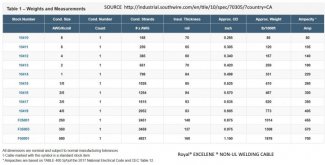It really is best to work it all out first before buying a single thing. You have the very "basic" part sorted.
The Inverter gives me pause being 6000W because at 6kw that's 250A and x2 for High Frequency or 3x for Low Frequency inverters for Surge Handling. Generally, for 24V 4-5kw is the limit, after which 48V makes more sense, simply due to the amperage being pulled. I am not familiar with SunGold Power other than the little mention here occasionally.
The big costs lurking is the BOS. Fuses, breakers, wiring, switches and all that stuff... you easily notice the $500 or $1000 item but those damned $10 & $20 odds and sods get ya. Even things like battery cables, seem innocuous, pick the wrong set & need to upgrade your into coin... Example, 24V/250A 6' long run (typically 6-8 feet is usual) you'll need 4/0 cable, especially if you think you'll have surges to handle. See the chart below. I run 24V and have pushed 200-225A through 4/0 but I have longer runs @ 12' total.
There are several factors to consider in so you build a system that has a solid base that you can add to as needed / wanted in the future without having to incur significant costs. There is one constant, we all build our systems, even with the best planning figuring we got it "nailed" but within a year or two, we realize that we have to do some tweaking / updating. Lesson Learned, I built for 24V/3kw originally using 2/0 wire, within a year, upgraded to 4kw and had to go up to 4.0, both costly things, which also meant new fuses & breakers too. Happens quite a lot.
A parting thought. There are some things you can play the "economy" game with, as long as you stick with known good reputable "value" brands and there are several used & discussed on here. There are other economy things can be damaging to equipment at best or deadly at worst, such as fuses & breakers, even some wiring.
Hope it helps, Good Luck.
PS, have a look at the links in my signature, including about my system, they may be helpful.
View attachment 31626



